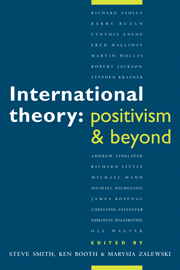Book contents
- Frontmatter
- Contents
- List of contributors
- Preface and acknowledgements
- Introduction
- I Debates
- II Legacies
- III Silences
- IV Openings
- V Directions
- 14 The last post?
- 15 Probing puzzles persistently: a desirable but improbable future for IR theory
- 16 The future of international relations: fears and hopes
- 17 75 years on: rewriting the subject's past – reinventing its future
- 18 ‘All these theories yet the bodies keep piling up’: theories, theorists, theorising
- Index
18 - ‘All these theories yet the bodies keep piling up’: theories, theorists, theorising
Published online by Cambridge University Press: 09 March 2010
- Frontmatter
- Contents
- List of contributors
- Preface and acknowledgements
- Introduction
- I Debates
- II Legacies
- III Silences
- IV Openings
- V Directions
- 14 The last post?
- 15 Probing puzzles persistently: a desirable but improbable future for IR theory
- 16 The future of international relations: fears and hopes
- 17 75 years on: rewriting the subject's past – reinventing its future
- 18 ‘All these theories yet the bodies keep piling up’: theories, theorists, theorising
- Index
Summary
What difference does it make that the contributors to this volume have varying understandings and conceptions of theory? Are the variations significant and if so to whom and why? Debates about theory sometimes bring out the worst in those of us involved in the discipline of International Relations. Academic conferences, and the resulting volumes, are often the places where insults get hurled both by those who consider themselves, or are considered, to be primarily concerned with theory (we can call these the ‘theorists’) and those who regard theory as something of a dubious, even self-indulgent, pursuit (we might refer to these as the ‘real worlders’). The ‘theorists’ regularly claim that the ‘real worlders’ don't understand what theory is or how important it is. The ‘real worlders’ claim that ‘the theorists’ are stuck in their ivory towers and have little to say that can help us understand or do something about events such as the Holocaust, the Second World War or the contemporary war in the former Yugoslavia. These debates about theory are evident in the chapters in this volume as well as at the conference that preceded it.
I think that underlying these central debates about theory is an important and significant layer of fear, which has institutional, intellectual and practical aspects. What I mean here is that there are serious differences of opinion about what it takes to enable politics to happen; in other words, how do we, and can we, think and act about the daily tragedies, inequalities and devastations in world politics? One question that arises out of this is partially implied by the title of this chapter.
- Type
- Chapter
- Information
- International TheoryPositivism and Beyond, pp. 340 - 353Publisher: Cambridge University PressPrint publication year: 1996
- 34
- Cited by



